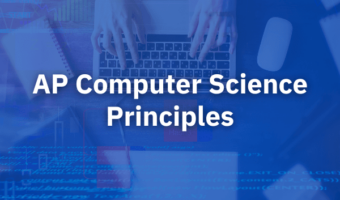AP Computer Science Principles Course
About This Course
The AP Computer Science Principles course at Brilliant Academe provides a comprehensive introduction to the world of computing. This course is designed to develop students’ understanding of the essential concepts and practices of computer science while emphasizing creativity, problem-solving, and real-world applications. Through a combination of theoretical lessons and hands-on projects, students will explore topics such as the internet, data analysis, algorithms, and programming, with a focus on how computing impacts society.
Encouraging Students and Parents to Participate
Broad Overview of Computer Science:
- AP CSP is perfect for students who want a comprehensive introduction to the field of computer science. The course covers a wide range of topics, from programming to data analysis, making it suitable for students with diverse interests.
Real-World Impact:
- The course focuses on the real-world implications of computing, teaching students how to apply computer science principles to solve problems that matter. This approach equips students with the skills to tackle challenges in any field, from healthcare to environmental science.
Creative Expression:
- AP CSP emphasizes creativity and innovation, allowing students to design their own projects and explore computing in unique ways. Whether it’s developing an app, analyzing data trends, or creating digital art, students will find plenty of opportunities to express themselves.
College Credit:
- Successfully completing the AP CSP exam can earn students college credit, giving them an academic advantage. The skills learned in this course are also highly valued in college admissions, as they demonstrate a student’s ability to think critically and solve complex problems.
Comprehensive Support:
- At Brilliant Academe, we provide dedicated mentors and a collaborative learning environment to ensure students succeed. Through hands-on projects, peer collaboration, and personalized guidance, students are fully prepared to excel in the AP CSP exam.
Career Pathways:
- The skills gained in AP CSP are applicable to a wide range of careers. From software development to cybersecurity, data analysis to digital marketing, this course lays the groundwork for success in the rapidly growing tech industry.
Parental Involvement:
- Encourage parents to stay engaged by attending our information sessions and monitoring their child’s progress. Parental support is crucial in motivating students to excel in this course and beyond.
Course Benefits:
- Hands-On Learning: Engage in interactive projects and activities that make learning dynamic and enjoyable.
- College Credit Opportunity: Earn college credit by successfully completing the AP CSP exam, giving you a head start on your academic journey.
- Foundation for Future Studies: Build a strong foundation in computer science that prepares you for advanced courses like AP Computer Science A.
- Career Readiness: Develop skills that are highly valued in the tech industry, opening doors to future career opportunities.
- Creative Exploration: Encourage creativity by allowing students to design their own projects and explore computing in innovative ways.
- Ethical Understanding: Gain a critical perspective on the ethical and societal impacts of computing technology.
- Collaboration and Communication: Improve teamwork and communication skills through group projects and discussions.
Frequently Asked Questions
What is the AP Computer Science Principles course?
AP CSP is an introductory course that covers the fundamentals of computing, including programming, data analysis, and the impact of technology on society.
How does AP CSP differ from AP Computer Science A?
While AP CSP provides a broad overview of computing and emphasizes creativity and real-world applications, AP Computer Science A focuses more on programming and object-oriented concepts in Java.
What are the prerequisites for AP CSP?
AP CSP is designed for students with little to no prior experience in computer science, making it accessible to a wide range of students.
How can AP CSP help in college and career?
AP CSP develops critical thinking, problem-solving, and technical skills that are essential for success in college and a wide variety of careers, especially in technology-related fields.
Learning Objectives
Requirements
- No Prior Programming Experience Required: This course is accessible to students with little to no background in computer science. A basic understanding of mathematics is recommended, but the course is designed to build foundational knowledge from the ground up.
Target Audience
- High School Students: Ideal for students in grades 9-12 who are interested in exploring computer science and gaining foundational knowledge.
- Beginners in Computer Science: Suitable for those with no prior experience in programming or computer science.
- College-Bound Students: Recommended for students who wish to earn college credit and strengthen their college applications.
- Future Technologists: Perfect for students considering a future career in technology, engineering, or data science.
- Creative Thinkers: Encourages students with an interest in creativity and innovation to explore the possibilities of computing.





